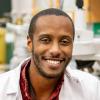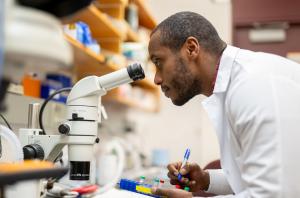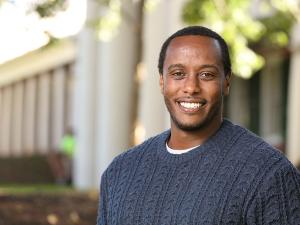Daniel Abebayehu, Ph.D.

About
Daniel Abebayehu uses biomaterials and high-dimensional approaches to study immuno-stromal axes to determine avenues for intervention that prevent fibrosis and promote repair. The lab's specific areas of interest are in pulmonary injury and repair and modulating responses to biomaterials. The goal is to identify novel diagnostic an therapeutic approaches for pulmonary fibrosis, as well as leverage existing biomaterial platforms in order to improve outcomes for biomaterials that are used clinically. Funding for this work is primarily through the National Institutes of Health and the University of Virginia.
Abebayehu's lab is set at the intersection of different fields, due to the inherently interdisciplinary nature of investigating immune cell and fibroblast crosstalk in the context of fibrosis and tissue repair. The result is a group that sees scientific questions and problems in a new way, pose innovative solutions and answer pressing questions in wound healing. These creative and innovative approaches open new lines of investigation, create a lasting impact on the field and unveil new mechanisms that could impact other fields.
As a postdoctoral fellow in biomedical engineering at UVA, Abebayehu founded UVA Emerging Leaders in Biomedical Engineering, an annual research symposium that highlights the work of senior postdoctoral fellows from underrepresented backgrounds. His commitment to promoting diversity and inclusion at each stage of his career is evidenced by an IMSD fellowship as a graduate student with the VCU Center on Health Disparities, during his tenure as postdoctoral representative for the BME Department's DEI committee at UVA, and being awarded a prestigious NIH MOSAIC K99/R00 award.
Education
2019-2023 NRSA Postdoctoral Fellow, University of Virginia
2017-2019 Postdoctoral Fellow, Cardiovascular Research Center, University of Virginia
2017 Virginia Commonwealth University, Ph.D., Bioengineering and Biomedical Engineering
2011 University of Virginia, B.S., Bioengineering and Biomedical Engineering
The goal of the field I’m in — immuno-engineering — is to try to tinker with the immune system to promote human health using the body’s own systems to change cells and control health outcomes.

